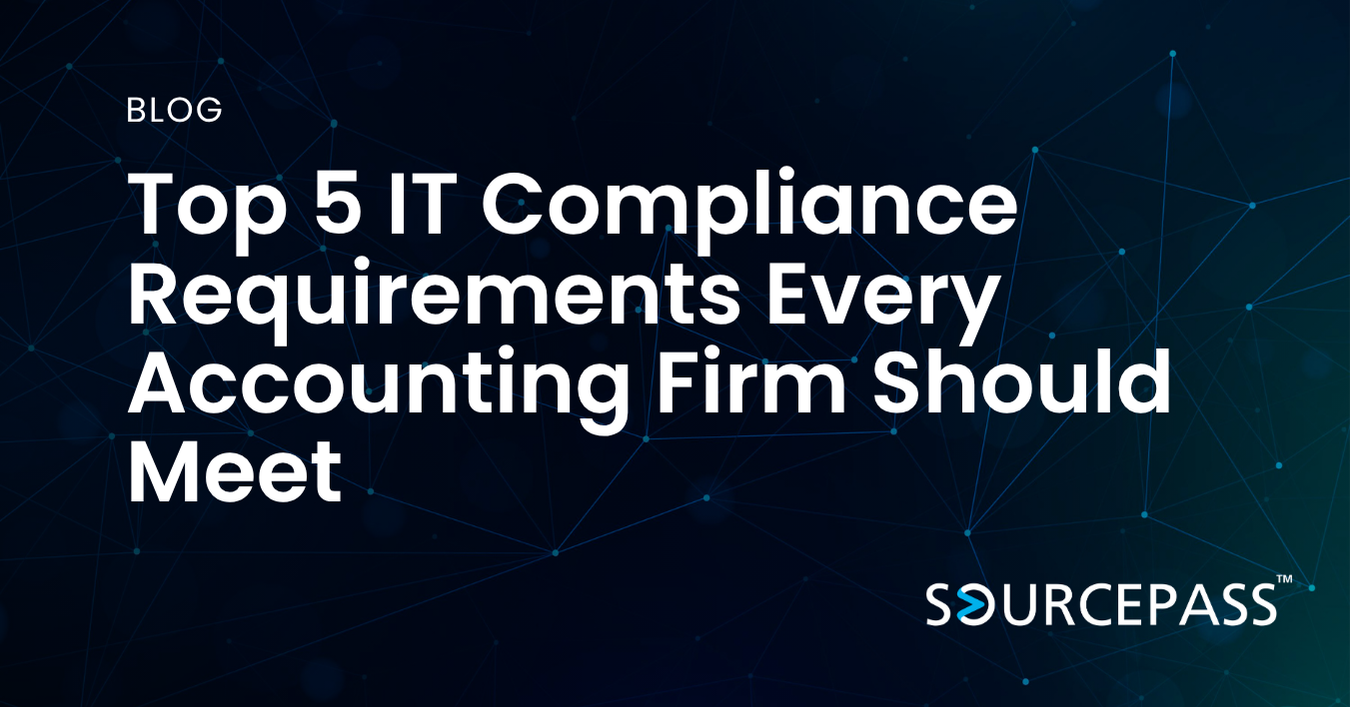Top 5 IT Compliance Requirements Every Accounting Firm Should Meet
Jun 03, 2025 Alex Davis Industry - Financial Sector & Private Equity | Security & Compliance 2 min read



Accounting firms manage some of the most sensitive data in the business world—financial statements, tax returns, payroll records, and personally identifiable information (PII). With growing cybersecurity threats and stricter regulatory requirements, IT compliance is no longer optional for CPA firms.
Firms that fail to meet compliance standards risk not only data breaches and fines, but also long-term damage to their reputation and client trust. In this article, we’ll break down the top 5 IT compliance requirements every accounting firm should meet to ensure data security, regulatory alignment, and business continuity.
1. Data Encryption and Access Controls
One of the foundational components of accounting IT compliance is protecting client financial data both at rest and in transit. Data encryption ensures that even if data is intercepted or accessed without authorization, it remains unreadable.
Best practices include:
- Encrypting sensitive files and databases using AES-256 or similar standards
- Using encrypted communication channels (SSL/TLS) for emails and file transfers
- Implementing multi-factor authentication (MFA) for all users
- Enforcing role-based access controls to limit data exposure
These steps are critical to meeting compliance requirements under standards like GLBA, SOX, and various state-level data protection laws.
2. Written Information Security Plan (WISP)
A WISP outlines the policies and procedures your firm follows to safeguard sensitive information. This is not just a best practice—many state and federal regulations now require formal documentation of your data protection efforts.
Key elements of a WISP include:
- Risk assessment protocols
- Acceptable use and data access policies
- Incident response plan
- Employee security awareness training
- Vendor and third-party risk management
Without a WISP, your firm may struggle to demonstrate CPA firm cybersecurity compliance during audits or investigations.
3. Regular Security Audits and Risk Assessments
Ongoing assessments are crucial for identifying vulnerabilities before they lead to data breaches. Many compliance frameworks, including SOX and GLBA, mandate regular evaluations of your security posture.
Accounting firms should perform:
- Internal audits of system and network security
- Penetration testing and vulnerability scanning
- Third-party security assessments
- Annual reviews of compliance with applicable laws
These audits help firms align with best practices and show regulators and clients that financial data protection is a top priority.
4. Secure Data Backup and Business Continuity Planning
Regulatory bodies require accounting firms to maintain access to critical financial records—even in the event of a disaster. That means having reliable, secure backup and recovery systems in place.
Compliance-driven data backup strategies should include:
- Encrypted offsite or cloud backups
- Regular testing of backup restore processes
- Clearly defined recovery time objectives (RTOs) and recovery point objectives (RPOs)
- Documented disaster recovery and business continuity plans
Whether you’re dealing with a natural disaster or a ransomware attack, these systems are key to maintaining compliance and operational resilience.
5. Compliance with Industry Regulations (SOX, GLBA, IRS Pub. 4557)
Firms must adhere to multiple regulatory standards, depending on the services they provide and the types of data they handle. The most common frameworks that apply to CPA firms include:
- Sarbanes-Oxley (SOX) – Applies to accounting firms working with publicly traded companies. Requires strong internal controls and accurate financial data reporting.
- Gramm-Leach-Bliley Act (GLBA) – Requires financial institutions, including CPA firms, to explain how they share and protect client data.
- IRS Publication 4557 – Provides security guidelines for tax professionals to safeguard taxpayer data.
Compliance with these regulations requires a combination of policy development, technology implementation, and employee training. Working with a compliance-focused IT provider can help streamline this process.
Strengthen Your Compliance with Sourcepass Experts
Meeting IT compliance requirements is not just about avoiding penalties—it’s about building trust, protecting your clients, and maintaining your firm's reputation. By prioritizing data encryption, formal security policies, risk assessments, secure backups, and regulatory adherence, your accounting firm can stay secure and compliant in an increasingly digital world.
Our team specializes in IT for accounting firms and can help you implement the right tools, policies, and protections to stay ahead of regulatory demands. Contact us today for a free consultation or IT audit tailored to CPA firms.
Subscribe To
Sourcepass Insights
Sourcepass Insights
Stay in the loop and never miss out on the latest updates by subscribing to our newsletter today!



